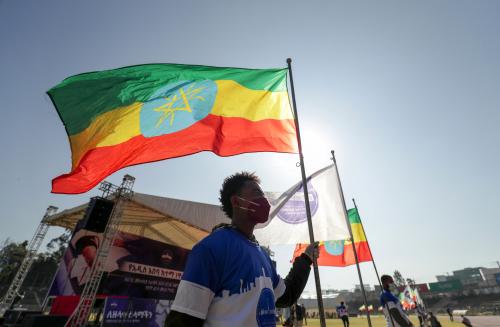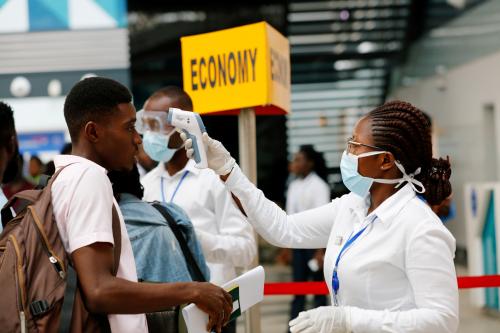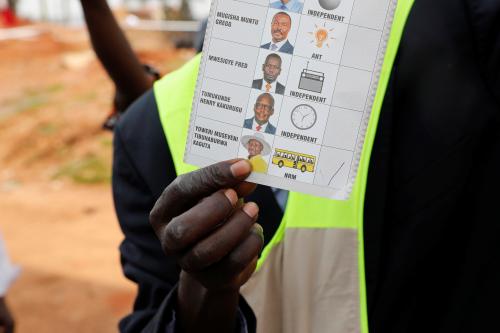Guinea holds presidential election
On Sunday, October 18, Guinea held its presidential election contested between 82-year-old incumbent President Alpha Condé and opposition leader Cellou Dalein Diallo. Tensions were already on the rise in the lead up to the election as, earlier this year, the country amended its constitution, a move that allowed for Condé, who has been in power since 2010, to run for a third term. The country saw violent protests in the wake of that change.
By Monday, Diallo and his supporters had declared victory, citing information gathered at polling stations despite their claim of the existence of “serious anomalies that marred the smooth running of the … election.” However, the national electoral commission has stated that official results won’t be ready until the end of the week, calling Diallo’s claim “premature” and “void.” As of this writing, a winner has yet to be announced. Notably, election monitors from the African Union and the Economic Community of West African States (ECOWAS) agreed that the election was held in transparency and lawfully.
In addition, 10 other candidates stood in the election, meaning that there is a chance for no clear majority winner, in which case the country would hold a runoff on November 24. As of this writing, though, partial results do show Condé with a lead.
Experts have noted that the contest between the two men could inflame tensions between the country’s two largest ethnic groups, the Mandinka and the Fulani, from which Condé and Diallo, respectively, draw support. In fact, on the eve of the election, United Nations Secretary-General Antonio Guterres “urged all political leaders and their supporters to refrain from acts of incitement, inflammatory language, ethnic profiling and violence.”
While election day passed peacefully, instances of violence occurred not long after Diallo announced victory, including reports of gunshots and tear gas in Conakry, where at least three people were killed and several wounded. By Wednesday, the country’s security ministry confirmed the deaths of at least 10 people—eight civilians and two police. The recent violence adds to the death toll of at least 50 due to many tragic events in the lead up to the election.
Sudan is removed from US ‘State Sponsors of Terrorism’ list
On Friday, October 23, U.S. President Donald Trump signed a waiver to remove Sudan from the state sponsors of terrorism list. As part of the agreement, the U.S. administration has negotiated for Sudan to transfer $355 million to compensate U.S. victims of terrorism and their families in order to be eligible for removal from the list. During negotiations for Sudan’s removal from this list, the U.S. also pushed for Sudan to normalize its relations with Israel, a country with which Sudan is technically at war. On Friday, the U.S. announced that this push had been successful, and that Sudan had agreed to normalize relations with Israel, following a one-day visit by an Israeli delegation to Sudan on Wednesday.
Sudan was first designated to the state sponsors of terrorism list in 1993, due to former Sudanese President Omar al-Bashir’s support for Hezbollah and other Islamist extremist groups. The removal of the designation allows Sudan to receive international financial assistance from the U.S. as well as multilateral organizations including the World Bank and International Monetary Fund, among other benefits. This move will help provide Sudan with relief for some of its $60 billion of external debt and deal with an economic crisis that has seen inflation of over 200 percent this year.
Protests in Nigeria and Côte d’Ivoire
Protests in Nigeria have continued to unfold over the past week. On Tuesday, October 20, the police opened fire on peaceful protestors, killing at least 12 and injuring hundreds. In a televised address on Thursday, Nigerian President Muhammadu Buhari called on Nigerian youths to “discontinue the street protests,” but did not mention the killings. Internationally, the killings have been condemned by a wide range of political and celebrity figures, including the African Union, U.S. Secretary of State Mike Pompeo, the United Nations, and the high representative/vice president of the European Union. The protests, which were sparked by anger at abuses by the Special Anti-Robbery Squad (SARS) federal police unit, have since evolved into broader anti-government demonstrations.
In Côte d’Ivoire, protests over current President Alassane Ouattara’s controversial decision to run for a third term have resulted in clashes between supporters of the president and the opposition party, and the deaths at least 20 since August, with six people killed in clashes this week. Since September, opposition figures have called for civil disobedience to protest Ouattara’s decision, and, last week, two opposition candidates also called for their supporters to boycott the election, which is scheduled to take place on October 31. The Economic Community of West African States (ECOWAS) has encouraged the opposition to reconsider their calls for boycott and civil disobedience. Ivorians and observers both wish to avoid a situation similar to that of a decade ago, when a disputed election led to a civil war that killed 3,000 people.






Commentary
Africa in the news: Guinea, Sudan, Nigeria, and Côte d’Ivoire updates
October 24, 2020